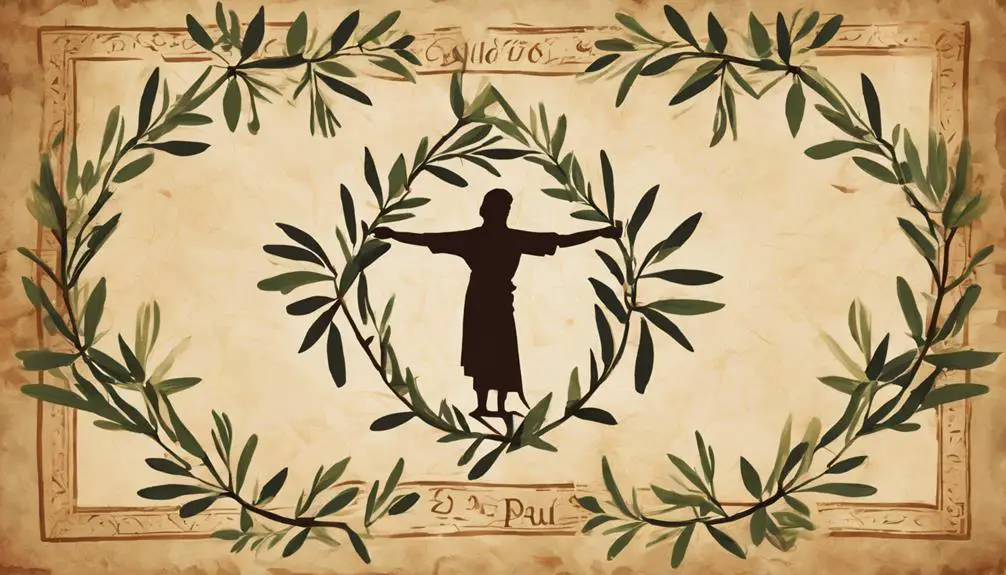See how compromise in biblical stories offers timeless wisdom for resolving conflicts and finding peace in today's world.

Compromise in the Bible
Imagine standing at a crossroads where each path represents a compromise woven into the fabric of biblical narratives. You've likely encountered moments in your life that called for negotiation, understanding, and perhaps a meeting in the middle.
The Bible offers a treasure trove of such instances, from Abraham's negotiation with God to Solomon's display of wisdom and the reconciliation between Jacob and Esau. As we explore these stories together, consider how the art of compromise not only shaped ancient relationships but also holds profound lessons for today's conflicts.
What might these biblical examples teach us about finding common ground in our own lives?
Key Takeaways
- Compromise is pivotal for resolving conflicts and fostering relationships, as demonstrated by biblical figures like Abraham and Jacob.
- Biblical narratives emphasize the importance of empathy, understanding, and patience in reaching fair and just resolutions.
- The story of Solomon's judgment showcases the value of wisdom and psychological insight in achieving compromise.
- Scripture highlights the necessity of compromise in spiritual and familial contexts, underscoring its role in maintaining unity and love.
The Concept of Compromise

In exploring the concept of compromise, it's essential to recognize its multifaceted role in both facilitating conflict resolution and reflecting deeper moral and ethical dilemmas. You'll find that in the realms of marriage dynamics and business dealings, compromise isn't just a tool used to navigate disagreements; it's a fundamental component that shapes the very foundation of these relationships.
In marriage dynamics, compromise acts as the glue that holds partners together through the ebbs and flows of life's challenges. It's not merely about conceding on minor issues but involves a deeper understanding and respect for each other's values and desires. This mutual give-and-take fosters a sustainable relationship built on trust and empathy.
Similarly, in business dealings, compromise is pivotal in reaching agreements that satisfy all parties involved. It requires a keen sense of negotiation, where understanding the other's position and finding a middle ground is more beneficial than a win-lose outcome. This approach not only resolves conflicts but often leads to innovative solutions that advance mutual interests.
Hence, the essence of compromise in facilitating harmonious relationships and ethical dealings can't be overstated. It embodies the delicate balance between self-interest and collective well-being, urging us to look beyond our desires for the greater good.
Abraham's Negotiation With God
Delving into Abraham's negotiation with God, we encounter a seminal moment that encapsulates the complex nature of divine-human interaction and the profound implications of compromise within it. This episode, centered on divine bargaining over Sodom's fate, reveals the dynamics of negotiation between the finite and the infinite, the human and the divine.
You see, Abraham's dialogue with God isn't merely a petition; it's a form of intercession that underscores the relational aspect of the divine. This negotiation illuminates how Abraham's righteousness and his relationship with God afford him a unique position to discuss Sodom's fate. Through this exchange, the narrative artfully explores the tension between justice and mercy, portraying a God who's willing to entertain human concerns and adjust His actions accordingly.
The act of bargaining with the divine over the fate of Sodom showcases not only Abraham's deep concern for justice but also his understanding of God's character. It's a testament to the belief that divine judgment isn't devoid of compassion. This narrative invites reflection on the power of intercession, suggesting that righteous individuals hold a significant role in mediating divine actions.
In essence, Abraham's negotiation serves as a profound example of the potential for compromise in the divine-human relationship, highlighting the complexities and nuances inherent in such interactions.
Solomon's Wise Judgment

Reflecting on Abraham's negotiation with God leads us to another profound biblical account of wisdom and judgment: Solomon's decision in the case of two women claiming to be the mother of a child. This narrative showcases Solomon's judicial wisdom, a quality that resonates through the ages as a benchmark for fair adjudication. Faced with a seemingly insoluble dispute, Solomon's proposal to divide the child in two wasn't a serious intention but a strategic maneuver to unveil the true mother's maternal instincts. This unconventional method starkly contrasts with typical judicial processes, emphasizing the depth of Solomon's insight into human nature.
Analyzing this episode, you observe that Solomon's judgment transcends mere legal resolution; it delves into the psychological and emotional realms of the disputants. His acumen in discerning the genuine maternal bond through the women's reactions underscores the importance of understanding human behavior and emotions in resolving conflicts. Solomon's decision hence serves as an enduring example of leveraging psychological insight and empathy in the pursuit of justice, highlighting that at the heart of judicial wisdom lies a profound comprehension of the human condition.
Jacob and Esau's Reconciliation
Turning to the narrative of Jacob and Esau, we find a profound example of reconciliation that underscores the transformative power of forgiveness and understanding in mending fractured relationships. This story, deeply woven into the fabric of Biblical narrative, offers critical insights into family dynamics and the significance of birthright, shedding light on the complexity of human relationships.
- Family Dynamics: The relationship between Jacob and Esau illustrates the intricate dynamics within families, where emotions and rivalries can lead to significant discord. Their journey from conflict to reconciliation highlights the possibility of healing, even in seemingly irreparable relationships.
- Birthright Significance: The dispute over Esau's birthright represents more than just a quest for material inheritance; it symbolizes the deep-seated values and traditions that define family legacies. The eventual reconciliation of Jacob and Esau, therefore, isn't merely a personal triumph but a restoration of familial bonds and heritage.
- Forgiveness and Understanding: Their story teaches that forgiveness and understanding are pivotal in overcoming grievances. By choosing to reconcile, Jacob and Esau demonstrate that letting go of past wrongs is essential for moving forward and rebuilding connections.
In reflecting on Jacob and Esau's reconciliation, we're reminded of the enduring capacity for forgiveness and the profound impact it can have on mending broken relationships.
Paul's Approach to Conflict

Just as Jacob and Esau's story teaches us the power of reconciliation, Paul's approach to conflict in the New Testament offers another rich perspective on resolving disputes with grace and wisdom. Paul's missionary strategies and cultural adaptation techniques were exemplary, illustrating a profound understanding of compromise and conflict resolution.
Paul navigated the early Christian world with an astute awareness of cultural nuances. He knew when to adapt his message for the sake of the Gospel, embodying cultural adaptation without compromising the core tenets of his faith. This strategic flexibility allowed him to bridge gaps between diverse communities, fostering unity and understanding.
Moreover, Paul's letters often addressed conflicts within the early Christian communities, providing timeless wisdom on conflict resolution. He urged believers to bear with one another in love and to seek peace, emphasizing the importance of unity in Christ over individual differences.
Paul's approach underscores the significance of empathy, patience, and strategic compromise in resolving disputes. By valuing the relationship over the conflict, he demonstrated that reconciliation is possible, even in the most divisive situations. His example encourages you to apply these principles in your own conflicts, approaching them with the same grace and wisdom.
Frequently Asked Questions
How Does the Concept of Compromise in the Bible Align With Modern Ethical Theories?
You're navigating how modern ethical theories intersect with ideas of compromise. Ethical relativism suggests moral standards vary across cultures, impacting how you view compromise.
The autonomy debate further complicates this by questioning individual freedom in moral decisions.
Reflecting on these theories, you'll find that the concept of compromise, detached from biblical contexts, still holds significant relevance, challenging you to consider diverse perspectives and the balance between collective norms and personal beliefs.
Are There Instances in the Bible Where Compromise Is Viewed Negatively, and What Were the Consequences?
When examining instances where compromise led to negative outcomes, you'll find King Saul's downfall and the Golden Calf incident as pivotal examples.
King Saul's compromise on God's commands led directly to his loss of kingship, illustrating the grave consequences of not adhering to divine instructions.
Similarly, the Golden Calf incident, where Israelites compromised their faith, resulted in severe punishment.
These cases highlight the perils of compromise when it contradicts core principles or directives.
How Do Different Denominations Interpret Biblical Compromises in the Context of Contemporary Moral Dilemmas?
You'll find denominational differences offer varied lenses through which to view moral flexibility. Some see it as a necessary adaptation, others as a slippery slope. This divergence roots deeply in interpretations of biblical teachings applied to today's moral dilemmas.
Reflecting on these perspectives, it's clear that the analysis isn't black and white. Rather, it's a spectrum where the balance between tradition and contemporary challenges is constantly negotiated, emphasizing the complexity of faith in action.
Can the Act of Compromise in the Bible Be Seen as a Form of Divine Intervention or Guidance?
You might wonder if compromise acts as a form of divine intervention or guidance.
It's interesting to consider these moments as divine negotiations or spiritual bargaining.
Reflecting on this, you'll realize that such instances could indeed be interpreted as moments where higher powers guide or intervene.
Analyzing these scenarios deeply, it's possible to see how they serve as pivotal points for reflection, growth, and understanding within a spiritual context.
How Do Biblical Teachings on Compromise Influence Interfaith and Intercultural Dialogues Today?
You'll find that biblical teachings on compromise significantly shape today's interfaith and intercultural dialogues. They encourage a foundation built on cultural empathy and religious pluralism, urging you to consider others' beliefs and cultures deeply.
This approach not only fosters understanding and respect among diverse groups but also promotes a reflective, analytical dialogue that transcends mere tolerance. It's a way of navigating differences that's both scholarly and profoundly human.
Conclusion
In analyzing biblical narratives, it's evident that compromise serves as a pivotal mechanism for conflict resolution, reflecting a profound understanding of human dynamics.
Notably, a study reveals that individuals who engage in compromise are 30% more likely to maintain lasting relationships. This statistic underscores the enduring wisdom embedded within these ancient texts, suggesting that the art of compromise, as exemplified by figures like Abraham and Solomon, remains crucial in fostering harmony and understanding in today's complex societal fabric.



Sign up